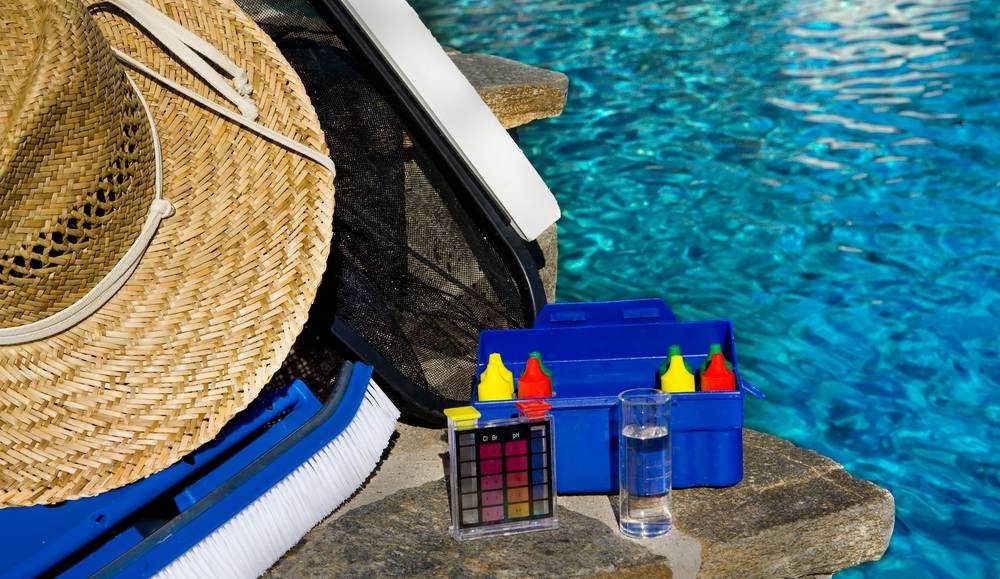I got this above ground pool for free last year. It has an Intex ECO15110 Sand Filter pump & Saltwater System with E.C.O. (Electrocatalytic Oxidation). The previous owner included a floating chlorine dispenser for tablets because she said that they struggled to get the ECO unit to generate chlorine properly. I put it aside and when I setup the pool this spring (April) I did not use the floater.
Every couple of weeks I took my water to be tested at Leslie's Pool store. And they regularly said my Chlorine levels were too low. And once in a while they would ask me if my generator was even working. Each time they asked I'd check the electrolytic cell and clean the white scale off by leaving it a cup of distilled vinegar with the electronics above the liquid level. But this last time, the employee asked me to bring in a sample directly from the output to test if my chlorine generator is working.
I brought in 2 samples today. One sample I turned on the pump, waited about 10 minutes and took a sample directly from the outflow. The second sample I took the normal way (away from the pump outflow) which is by placing the container upside down until I'm about a foot or 2 deep then flipping the container over. This chart has those 2 samples as well as my reading from 9/12.
The numbers since 9/12 changed dramatically because we had a hose leak that drained about 8 inches of water, which we refilled using the hose once we fixed the leak.
I run the generator/filter for 10 hours a night, it is a 8403 gallon pool. The filter pumps 1500GPH. The pump is currently running and has no error codes listed. The Pump and Working light are currently on.
I know the electrolytic cell does get white scale on it that I have to clean off occasionally. I would assume that means it's producing chlorine, but I guess it could just be hard water build up. I clean it about once a week.
Since the pool was free, I'm happy to simply buy a new setup (pump and generator), but if I can, I'd like to repair this one as sending this huge unit to the dump just seems wasteful. Assuming the employee is right and the salt water chlorine generator isn't working properly, I'm not sure if I should try replacing the electrolytic cell, the titanium electrode, or the pump motor and control.
Thanks,
Joe.
Every couple of weeks I took my water to be tested at Leslie's Pool store. And they regularly said my Chlorine levels were too low. And once in a while they would ask me if my generator was even working. Each time they asked I'd check the electrolytic cell and clean the white scale off by leaving it a cup of distilled vinegar with the electronics above the liquid level. But this last time, the employee asked me to bring in a sample directly from the output to test if my chlorine generator is working.
I brought in 2 samples today. One sample I turned on the pump, waited about 10 minutes and took a sample directly from the outflow. The second sample I took the normal way (away from the pump outflow) which is by placing the container upside down until I'm about a foot or 2 deep then flipping the container over. This chart has those 2 samples as well as my reading from 9/12.
| 10/3 Directly from output | 10/3 Away from output | 9/12 Reading | |
| Free Chlorine | 0.05 | 0.1 | 1.07 |
| Total Chlorine | 0.05 | 0.14 | 1.26 |
| pH | 8.1 | 7.9 | 7.4 |
| Total Alkalinity | 126 | 114 | 106 |
| Calcium Hardness | 222 | 238 | 227 |
| Cyanuric Acid | 14 | 36 | 34 |
| Iron | 0.1 | 0.1 | 0 |
| Copper | 0.1 | 0.2 | 0 |
| Phosphates | 0 | 0 | 0 |
| Salt | 1061 | 3046 | 3321 |
The numbers since 9/12 changed dramatically because we had a hose leak that drained about 8 inches of water, which we refilled using the hose once we fixed the leak.
I run the generator/filter for 10 hours a night, it is a 8403 gallon pool. The filter pumps 1500GPH. The pump is currently running and has no error codes listed. The Pump and Working light are currently on.
I know the electrolytic cell does get white scale on it that I have to clean off occasionally. I would assume that means it's producing chlorine, but I guess it could just be hard water build up. I clean it about once a week.
Since the pool was free, I'm happy to simply buy a new setup (pump and generator), but if I can, I'd like to repair this one as sending this huge unit to the dump just seems wasteful. Assuming the employee is right and the salt water chlorine generator isn't working properly, I'm not sure if I should try replacing the electrolytic cell, the titanium electrode, or the pump motor and control.
Thanks,
Joe.


